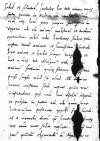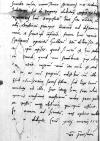Iactatus hoc toto anno variis fatis, partim in ⌊Russia⌋, ubi multa miserrima vidi atque horum pars magna fui, partim in ⌊Ungaria⌋, ubi non minus molestiarum et turbinum exanclavi, nihil vobis hactenus scribere potui, nostra tamen amicitia et suavissima [co]nsuetudo haeret animo et haerebit semper integ[errima] et licet a fatis toto disiungimur orbe, con[iunc]tis animis fortunam quamque feramus ...rrio quasi scripta nihil sit aliud.
Mi domine Ioannes carissime.
Scribi nequit, quantae rerum vicissitudines post vestrum hinc discessum contigerunt et praesertim in ⌊patria⌋ vestra, ubi omnia sunt Luteranismo profanata, expulsi prae..., sacerdotes et monachi, demum ipse ⌊senatus⌋ ... deiectus, nos omnia more solito negligere t...amus nunc pacem quandam chymeralem cum ⌊magistro⌋, [q]uae ut
succedet nescio, cum ⌊Turco⌋ speramus nos indutias habituros, sed de Ungaris dubitamus, cupimus ex his regionibus hanc tempestatem licet sero, ...lere, cum alii Christiani principes conivent ad discrimen nostrum et semet ipsi conficiunt. Fama huc venit caesarianos exercitum ⌊Gallorum⌋ totum delevisse et re[gem] ipsum cepisse, quod si verum est, hoc salte[m] eri[t co]mmodi, quod uno succumbente pax celerius [esse p]oterit. Negotium vestrum ita mihi est cordi et [cur]ae ac meum proprium, adest hic etiam ille praesul admissarius, sanus quidem, sed longe tamen mutatus ab illo, sive itaque hac sive alia quavis occasione accessionem vobis paene polliceri possum neque absentia quicquam officiet.
Ia[m] avocor ad ⌊senatum⌋, vos optime valete, [mequ]e diligite.


